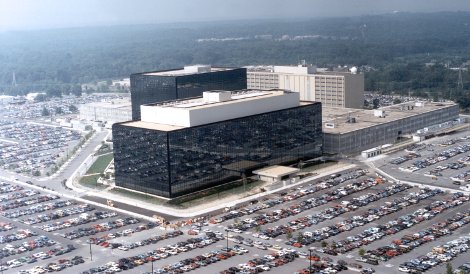The main spy agency of the US government, the National Security Agency (NSA), is building another massive data center in the State of Maryland, as construction of its Utah data center is approaching completion.
The agency held a groundbreaking ceremony on the US$565m project in Fort Meade, Maryland (home to the NSA headquarters), Thursday. The US Army Corps. of Engineers, which is overseeing construction of the High Performance Computing Center 2 (HPCC2), has awarded the design-build contract to a joint venture between two large US contractors Hensel Phelps and Kiewit.
According to contract-award documents, the facility will provide 60MW of power, incoming through a dedicated substation that will be built on site. The 600,000 sq ft building will house a 70,000 sq ft raised floor for the IT equipment.
In a statement, the NSA explained that the project, slated for completion in 2016, was part of a Comprehensive National Cybersecurity Initiative, launched by the White House in 2008. The initiative aims to create a unified approach to security the nation's digital infrastructure.
Maryland Senator Barbara Mikulski said Maryland was “the global epicenter of cybersecurty,” where lots of cyber-technology solutions and jobs were created. “Because of Maryland's incredible federal assets, like the NSA, our dynamic private sector and iconic academic institutions, America's cyber defense starts in Maryland,” she said.
“With this new state-of-the-art computing center, Maryland and the NSA will continue to protect America from cyber terrorists, spies and thugs.”
The agency built its $2bn data center in Utah to intercept digital communications over international, foreign and national networks, store and process the information it collects, according to a report by Wired. The next Maryland facility's purpose seems to be the same: “protecting national security networks and providing US authorities with intelligence and warnings about cyber threats.”
Reports about the Utah data center raised public concerns that the NSA may be too intrusive in collecting data from communications networks. Those concerns were fueled further by this week's report in the UK newspaper The Guardian that the agency had ordered Verizon, one of largest telcos in the US, to provide it with information on all domestic and international telephone calls going through its systems.
In the report, The Guardian cites a top-secret court order that requires Verizon to hand the information over to the NSA.
The Army Corp. received applications from more than 150 vendors to take part in the Maryland construction project. A wide range of construction and engineering firms, IT vendors, electrical system integrators, fencers, roofers and alarm companies, including Eaton, Panduit, Tyco, Tishman Balfour Beaty, Siemens, Quanta and many others, have gone for the business.
The government's description of the project has some energy-efficiency requirements for the design. These include 78F air temperature on the raised floor and a LEED Silver certification.
The data center will have a 30,000-ton chiller plant, and all systems will have to be concurrently maintainable.

